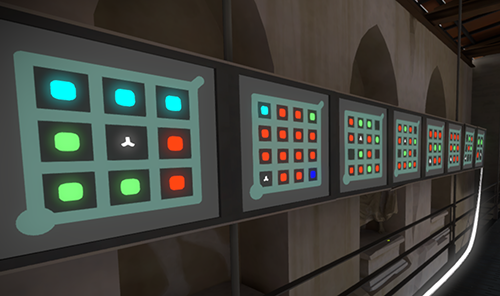(Content note: this is a spoiler-free review, though I can’t speak for commenters.)
The Witness is a puzzle game created by Jonathan Blow, famed creator of Braid. The central mechanic of this game is a path-drawing puzzle, which looks like this:

When I first saw this mechanic, my reaction was, “So adventure game designers finally discovered Nikoli-style puzzles, eh?” Nikoli is a Japanese publication that popularized a certain genre of puzzles using numbers or symbols on a grid. The best known puzzle of this genre is Sudoku, but there are many others, like Fillomino, Heyawake, Numberlink, Masyu, Slitherlink, and Nurikabe (almost all of which I think are better than Sudoku).
Outside of Nikoli, you can find many more created by Grandmaster Puzzles, and you can try the annual US Puzzle Championship. I should mention that I am fairly competitive in the USPC.
The advantage to Nikoli-style puzzles is that they’re scalable. Contrast with the Myst series, where most puzzles revolve around poorly-designed user interfaces for fantastic mechanisms. Could you really pack hundreds of such puzzles in a game? It would be too hard to write all those puzzles, much less make the graphics to support them. And since there are so few of those puzzles in the game, you have to make sure each one counts for every player, without being so challenging that players start looking for solutions online.
On the other hand, as far as Nikoli-style puzzles go, dedicated puzzle-crafters will have video game designers beat. Sorry, Professor Layton! What I want to see in a video game are puzzles that could only be done in a video game. Luckily, The Witness passes this test, being a lot less like a Nikoli puzzle than it first appears, and not just because solutions are non-unique.
[Read more…]

